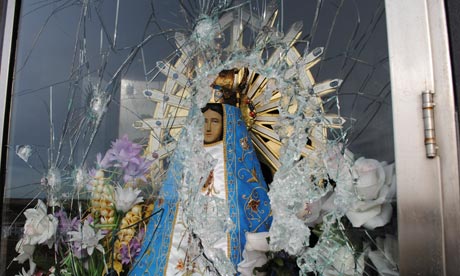By Heba Girgis
Impunity Watch Reporter, South America
BUENOS AIRES, Argentina—Last Wednesday night, August 1, 2012, the Argentinian foreign ministry sent a letter to the British government repudiating the desecration and vandalism of Argentina’s Falklands war cemetery. The cemetery was found vandalized a few days before and is the final resting place of 649 Argentine soldiers and also holds a glass case protecting Argentina’s patron said, the Virgin Mary. The glass case was found smashed.

The cemetery marks the memory of a war over possession of the islands that claimed the lives of over 600 Argentinians, 255 British soldiers, and three elderly islanders. While Argentina lost the war, the country has not given up its claim to the territory and has accused the British of ignoring UN resolutions encouraging talks over the sovereignty of the islands.
Families of the Argentinian soldiers laid to rest in the cemetery sent letters to the Argentinian foreign minister Hector Timerman and the British ambassador in Buenos Aires demanding an immediate, urgent, and exhaustive investigation.
The vandalism was believed to have happened anytime in the past week or more, said Sebastian Socodo, an Argentinian who takes care of the cemetery. Socodo also noted “It’s basically the glass that covers the Virgin Mary. They just smashed the glass. I don’t know with what or how,” and then said, “I was there a couple of weeks ago and there was no damage.”
Images of the vandalism reveal that the glass was broken by more than twelve forceful blows. The actual statue of the Virgin, whose blue and white colors are the only expression of Argentinian pride that are permitted in the islands, was removed from the cemetery to protect it until repairs can be made to the shrine and to the cemetery.
In response to the vandalism, the Argentine government has called for an “impartial investigation that identifies and punishes those responsible for a grave act that violates the sacredness of the cemetery.” The government has also presented a protest to the International Red Cross as well as the United Nations.
With the controversy over the Falklands, with the Argentine government refusing to recognize the Falklands, blamed Britain for provoking the “barbaric act” with its “hostile attitudes.”
This particular cemetery has been the main focus of attention during this past year’s 30th anniversary of Argentina’s occupation of the islands, but usually the cemetery, atop a hillside about an hour from the capital of Stanley, gets very few visitors.
For further information, please see:
Merco Press – Argentina Presents Official Protest to UK Over Malvinas Cemetery Vandalism – 2 August 2012
The Telegraph – Argentina Sends Britain Letter ‘Repudiating’ Desecration of Falklands War Cemetery – 2 August 2012
The Guardian – Argentina’s Falklands War Cemetery Vandalized – 1 August 2012
The Associated Press – Argentine War Cemetery in Falklands Vandalized – 31 July 2012


